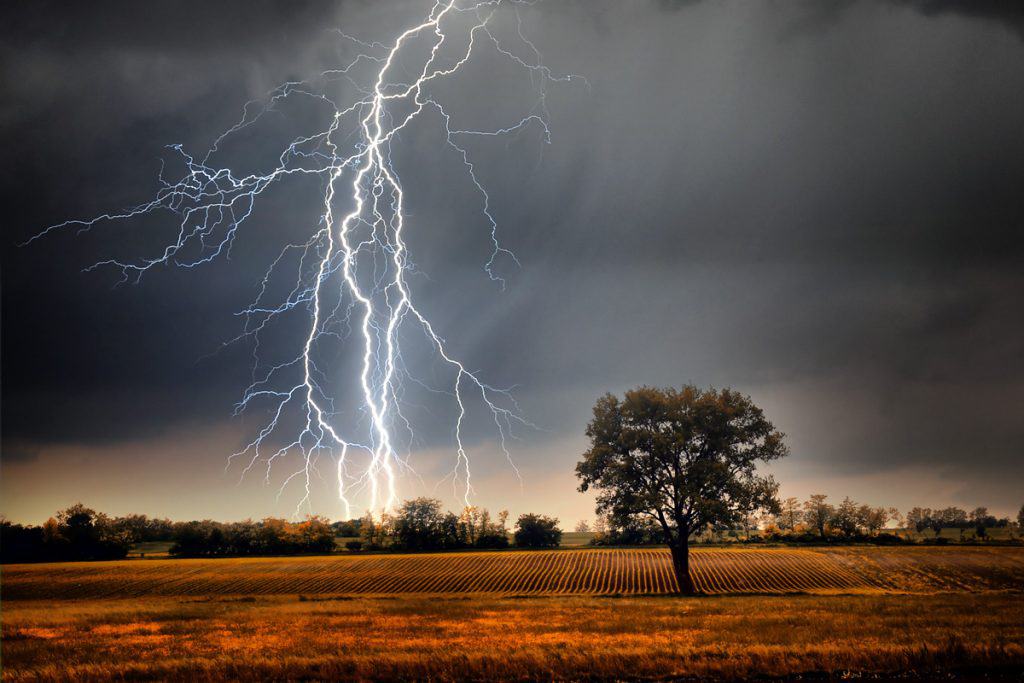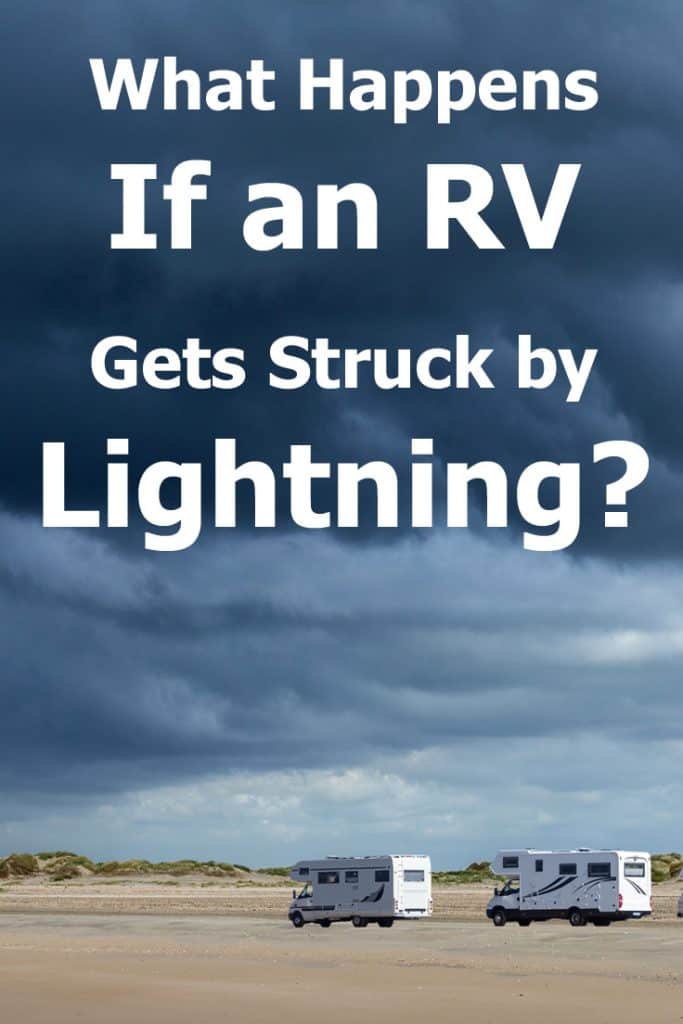As an RV owner, you probably wonder what would happen if you RV gets struck by lightning. After all, we tend to camp/RV in some very exposed areas and in all kinds of weather.
Assuming your RV has a metal (aluminum or steel) roof and frame, if lightning strikes, it may damage the RV's electronics, but people inside should be safe. If you're in your RV and a lightning storm is approaching, stay inside. If possible, disconnect the RV's electric hookup ahead of time, and switch off all electronic systems in your RV and/or tow vehicle to prevent them from being damaged by a lightning strike.
Still worried? You should be! Lightning is dangerous, and you need to make sure your RV is ready to withstand the potential threat lightning poses. Keep reading as we explain the in's and out's of the topic and provide you with more important tips.

RVs and Lightning - what you absolutely must know
We're going to discuss the dangers of lightning in detail further down this post. For now, let's assume we all agree that being hit by the huge electric surge is harmful - to living beings as well as to anything that has electronic systems - and that includes your RV.
And it doesn't just pose a threat to unprepared humans. Lightning can burn out your RV's systems too. See, a lightning doesn't even have to directly hit your RV to cause damage. Even a nearby hit can fry your electric systems.
Naturally, people are usually hit by lightning when they are outside their homes, often while engaging in outdoorsy sports like fishing or hiking. RV people are often out there exploring nature, making it very important for you to be lightning-aware.
If you plan on camping outside your RV in exposed areas, make sure you have a secondary safe zone. A tent or even a pop-up camper isn’t going to protect you from a lightning strike.
Which brings us to the next questions.
Will an actual motorhome or travel trailer protect you from lightning?
The answers depend on the material your RV is made of. In almost all modern RVs, there's a strong metal frame in the rig, which means you'll be fully protected inside. If you're in a very unique rig that's made out of wood, don't rely on that to protect you from lightning - seek shelter. However, with commercial RVs - the RV itself is the safest place for you to be when lightning strikes.
With this in mind, it's time to discuss what does keep you safe in vehicles against these dangerous circumstances: the Faraday Cage Effect.
The Concept of Faraday Cage Protection
While reading this article, your most likely thought to yourself, “why isn’t lightning an issue with cars?”
This is due to the Faraday Cage Effect.
This principle was something developed by Benjamin Franklin way back in 1755. The effect’s namesake Michael Faraday further developed it in 1836. In the simplest terms, it explains how your car is like a big metal cage that causes the lightning to go around your car instead of inside it.
Pretty neat, right?
Well, as you well know, not all RVs are built entirely out of metal. So, it gets a little bit more complicated when you explore how lightning will affect RVs.
Motorhomes and lightning
The first thing you must know is if you have a motorhome with a steel or aluminum roof, you’ll be fine. These roofs will offer you plenty of protection against a lightning storm.
In fact, these roofs will offer you the same protection a regular car would. So, if you have one of these, have no fear and enjoy the awesomeness of nature.
Honestly, even if you have a fiberglass roof, you should be fine as long as you have an aluminum frame. If it doesn’t have an aluminum frame, seek other means of shelter quickly.
The travel trailer or 5th wheel
For travel trailer or 5th wheel owners, it’s the same scenario as owning a motorhome. As long as, your rig has an aluminum or steel roof or frame, you’ll be able to ride out the storm safely.
If you don’t have either of these things, move into your tow vehicle for the duration of the storm. As previously stated, the Faraday Cage Effect will keep you completely safe.
Pop-up campers and lightning
A Pop-up camper is the last place you want to be during a lightning storm; well, besides outside. Sadly, these campers offer no security during lightning storms and are completely ineffective.
If you find yourself with no other shelter option, make sure your pop camper is away from anything that will attract electricity: metal structures, power lines, etc.
Overall, if you can avoid taking shelter inside a pop-up camper, do it. It’s a dangerous place that has a high risk of attracting a lightning strike.
How about your tow vehicle?
As previously stated, your tow vehicle will keep you completely safe. It’s one of the safest places you can be during a lightning storm.
However, if you’re parked, make sure you’re away from trees. There’s always a chance the lightning might strike a tree and have it fall onto your car. And this scenario isn’t something you want to experience, especially when you're on your RV vacation.
So, is it safe to be inside an RV during a lightning storm?
Yes, you’re completely safe in your RV as long as your rig has the capabilities to hold up during a lightning storm. These capabilities are described in the previous section, but let’s go over them again quickly.
If you want to use your RV as a shelter, it must have either an aluminum/steel roof or frame. It can even have both. But what it can’t have is a wood frame or a fiberglass roof with no aluminum/steel frame.
Otherwise, the key to staying safe is staying away from potential hazards such as trees and metal structures.
In the end, you’ll be fine if you take precautions and know the exact capabilities of your RV. And all these precautions will be laid out for you in the next section.
Caught in Your RV and a Lightning Storm is Approaching? Step-by-Step Guide
If you do find yourself stuck in your RV during the lightning storm, the following preventive measures could help.
Each of these will make the situation a lot less dangerous for you and your loved ones.
- If there's time - move away from trees
- Unplug shore power
- Turn off outside generators
- Roll down any antenna or flag poles
- Get inside
- Stay away from windows and doors
When you’re safe and sound, remember to enjoy the incredible show nature is providing you. Grab your camera and get some fantastic photos of the experience.
How to Ground Your RV
If you’re still a little worried about your safety, there’s another thing you can try: grounding your RV. The primary reason you’d ground your RV is “to carry voltages from lightning strikes harmlessly to the earth.” This process will lower the risk a lightning storm giving you any significant issues.
If a lightning strike does hit your RV, it needs a harmless path for it to reach the ground. If you don’t, the lightning strike will create side-flashes inside all your RV’s electronics.
These side flashes will end up destroying electronics inside your RV. So, instead, make sure the ground wire from the shore power plug is connected directly to your RV’s chassis.
You’ll also need to make the RV’s neutral line remains isolated from both the chassis and the ground. Overall, this process just makes sure the lightning strike has somewhere safe to go.
Now, we know this seems rather complicated. Therefore, it's essential you don’t make the mistake of trying to do this process by yourself if you’re feeling overwhelmed. There’s no shame in calling an electrician or RV technician to do it for you.
Remember it’s all about making sure your RV can act as a shelter for all the things you care about and first of foremost - yourself and your fellow passengers. If your RV ends up getting a direct lightning hit, there's a good chance that some damage to its system will occur, regardless of what you do.
The important thing is to stay inside and keep the people safe.
Why? Keep reading to see what the human danger is.
The Dangers of Lightning - Why you should be worried
Finally, now that we've discussed the implications on RVing, let's take a few minutes to talk about the very real dangers of lightning. Just so you'll see why you need to take this very seriously.
People often underestimate the dangers that a lightning storm poses. After all, haven’t we all heard the anecdote that the chances you’ll get struck by lightning are like one in some outrageously high number?
However, this ignorance has led to an eye-opening stat: lightning kills hundreds of people across the US every year, killing more Americans than hurricanes or tornadoes.
It seems like such an easy thing to avoid; you just go inside, right? Yes with enough lightning strikes across the US, not enough people get inside in time. Here's another astonishing fact: most people that get struck don’t end up dying.
In fact, only 10% of those hits end up as fatalities. The people that do survive, however, are haunted by the internal damage caused by the lightning strike. Often, these survivors are hampered by lifelong injuries usually of the neurological variety such as:
- Memory deficit
- Sleep disturbance
- Chronic pain
- Chronic dizziness
Other than these neurological issues, some survivors suffer from ruptured eardrums. Lightning strike survivors are also known to have a proclivity for developing cataracts later on in life.
So, as you can see, this is a major risk.
Fortunately, as an RV owner, you can protect yourself and your loved ones simply by getting inside and staying there for the duration of the storm.
As you travel, always be aware of the weather and make sure you're close to your RV if there's a risk for a lightning storm. Follow local instructions in the campground, stay inside when the storm hits and stay safe.
Please help others stay safe by sharing this post. You can use this image on Pinterest -

Be sure to check out these helpful posts:
How Long Does It Take To Set Up A Travel Trailer In A Campground?

Why wouldn’t you be protected from lightning in a popup made with an aluminum roof and frame made of aluminum? Doesn’t make sense that only a rv or travel trailer with those features would be the only way to stay safe
@terry rouse, because pop up campers are more or less half tent and half Jack in the box.The windows are usually made flimsy screen material, canvas and plastic.They would burn up at the first lightning strike. Plus the frame isn’t rigid enough and the coverage would be like being in a convertible.